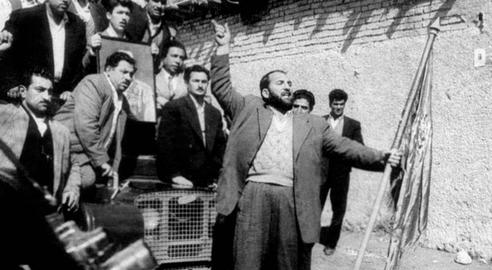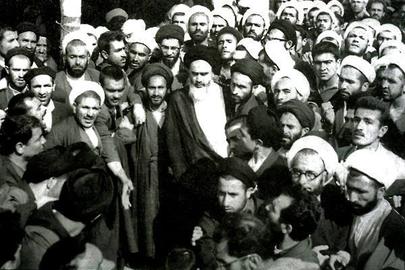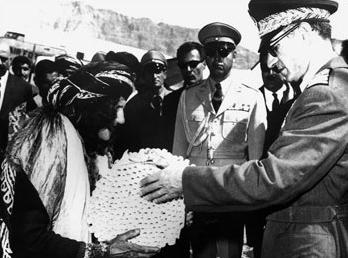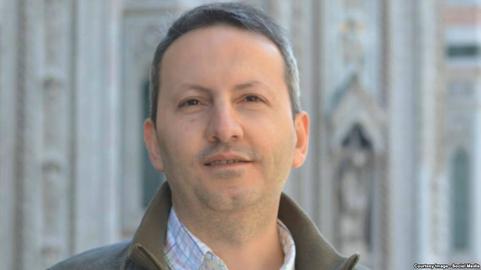Throughout IranWire’s series of interviews about the coup, most of the historians and experts we have talked to have highlighted the key role the CIA played, in complicity with the shah, Mohammad Reza Pahlavi. But there are a small number of historians whose work paints the Pahlavis, in a more positive light. A prime example is Andrew Scott Cooper, who first came to be known because of his book Oil Kings: How the US, Iran and Saudi Arabia Changed the Balance of Power in the Middle East (2011).
The title of Cooper’s new book, Fall of Heaven: The Pahlavis and the final days of Imperial Iran, indicates Cooper’s approach to the fallen monarch and the events of the late 20th century. Cooper based the book on US documents and many interviews with both the shah’s aides and his opponents. It fuelled forceful debates, with two very different reviews being published by two leading Iranian journalists, Azadeh Moaveni and Nazila Fathi, respectively in the New York Times and the Washington Post. The two very different takes (negative and positive) demonstrate how narratives of history continue to play a powerful role in discussions about Iran, its recent history, and its future. Even before being published in Persian translation, the news of a pro-Pahlavi book being published in the US made the rounds in Iran, and discussed on social media by people from both sides of the debate.
IranWire spoke on the phone to Andrew Scott Cooper about the coup, and about challenging the defining narrative of Iran’s recent history.
***
The 1953 coup has long occupied a major place in Iranian historiography. You are one of the very few historians who have had somewhat of a revisionist take on it in recent years.
I think the debate is long overdue and I think it’s an important debate that all Iranians should be interested in. When we look at the study of history, it doesn't matter which country you are talking about and which major event, it is very unusual for one historical narrative to define popular understandings of the event for such a long time. That’s what we’ve seen in case of Iran and 1953.
That narrative has been firmly in place for over half a century now. What’s happening now, and I regard as an inevitable, organic process is that different people are looking at the documents that we have and use different insights and perspectives that allow us to have a fuller understanding of what happened in 1953.
This is a very sensitive discussion for certain types of Iranian intellectuals who are very resistant to challenge a narrative that they've been comfortable with for a very long time. But, if you are a professionally trained historian, it’s natural to have a different perspective. This shouldn’t make people insecure or angry. It is actually a sign of intellectual maturity.
Two months ago, we saw the documents that finally came from the State Department. It will take scholars several years to process all those documents. It will take maybe another decade until a new book comes out, talking about 1953, taking it all into account. I think more work needs to be done on 1953 but, on the other hand, I don't think those documents contain a smoking gun. I don’t think they are going to radically reshape our understanding of 1953.
I think they should have been declassified a long time ago. I don’t understand the delay and I think the delay encouraged conspiracy theories and people believing that there was a CIA cover-up. I think the decision to not publish documents earlier was a political decision and I think it was a mistake. The more you try to suppress the historical record, the more people suspect that it’s a cover-up. It ends up distorting the historical discussion that is absolutely essential.
You clearly emphasize the need for reassessment. But what’s your own take?
I think that 1953 is a pivotal moment in modern Iranian history. I think it’s a turning point but I also would caution Iranians to put 1953 into a broader perspective, not only in Iranian modern history but contemporary world history. I think there is a tendency on the part of some people to look at 1953 as an isolated event.
We also have to be very carful about the language we use. The journalists who write about this events are floppy. Mossadegh wasn't democratically elected by the Iranian people. he was nominated by the majority of the members of Iranian parliament, the Majlis. They nominated him and his name was put to the shah and he signed a document that put Mossadegh in office.
But in this way, he would be similar to the British prime minister or any head of government in a constitutional monarchy.
That’s right. You and I understand the distinction but when that distinction is lost and not explained, that’s where the journalists have to be careful in how they use their language. It’s frustrating for some historians to see the way that popular events are simplified for public consumption because these are complex events.
This is the Cold War period and Iran was not the only country where this sort of overthrow happened.
I think the discussion will continue and I have to say I am much more interested in the history of revolution than in 1953. I think we are not going to learn a lot more about 1953. I think we’ve gone over this so many times. Sometimes scholarship is running around in circles. I see the same names involved over the debate in 1953. Sometimes it feels like there is an argument between particular individuals; scholarship and historiography is getting lost and it’s about “I said this, you said that.” I am not here for that. There is not going to be a settled event because no major event is ever completely settled; it doesn’t matter what country you are talking about.
But aren’t a lot of historical debates over key questions settled? You don’t find a lot of German historians with a revisionist take on Nazi Germany.
Look at the debate over the French revolution. There was a single accepted narrative on the French Revolution that lasted generally for about 200 years. Then you had an outsider, Simon Schama, who wrote a book called Citizens that came out in 1988, on the build-up to the 200th anniversary of the French revolution. And he was pilloried! His scholarship was attacked, he was mercilessly criticized by book reviewers and by other historians. They accused him of all sort of things. Now, 30 years later, his narrative is accepted as a different school of understanding on the French Revolution.
That’s what I mean with Iran of 1953 to 1979. You are going to finally see different schools of thought. There should never be a single accepted view of what happened and why about a major national event. That’s unhealthy. I think vigorous debate is good. It’s a sign of democracy and a sign that people are thinking. But sometimes, within the Iranian diaspora, I think it becomes very political and very personal. People get attacked and it’s very intimidating for young scholars, especially the younger Iranian scholars. I can tell you this as an outside scholar. I am aware that younger Iranian scholars feel intimidated to write articles or question the narrative that has been put into place by their elders, 30, 40, 50 years ago. We have to be a little more open in trying to understand how these events happened.
Your book Fall of the Heaven, which is soon to come out in Persian, made the headlines in Iran and has already been discussed quite a bit on social media. You have what one might say a positive view of the Pahlavi era. In what way do you think the shah was shaped by the 1953 coup?
First of all, I wanted to write an intimate account of the last two years of the monarchy and wanted to record the experience of people who were working with shah, people in the palace. I wanted to recreate what that atmosphere was like. It hadn’t been done before. In all other books that I’ve read, revolution is seen as this inevitable event. The shah is presented at this monster. He is hated and then he leaves and Khomeini comes.
But that’s not how history works. There are always different levels of understanding and experience. I wanted to understand that myself. I had many questions that I felt like the existing scholarship didn’t adequately explain.
Now, about 1953, the fact is that, as American documents confirm, up until to the very end, the shah resisted Kermit Roosevelt’s plans because I think he understood that if he was seen to approve foreign assistance in overthrowing an Iranian government, it could be the end of the monarchy. And 1953 cast a shadow. To an extent, he wanted to remove the taint of 1953. We can debate as to how successful he was. 1953 is obviously important but the reign of the second Pahlavi does not begin in 1953. The shah had already been on the throne for 12 years. Many people — not Iranians — but if you ask the average person of what they know about the shah, they might say that he was put on the throne by the CIA in 1953 and that is not true. He already had been on the throne for 12 years. If you want to understand the second Pahlavi [shah] you have to understand the whole life of the man and not just 1953.
I personally think that 1963, the first Khomeini uprising, is as important as 1953 and possibly, in some ways, it’d be interesting to see if it turns out to be more important. The year 1963 has been neglected by scholars. If you look at books about the Pahlavi period, 1963 is hardly discussed. We have to understand what happened in 1963, because this is the first sign of the rise of Shia fundamentalism and that’s very important.
The debate on 1953 is sometimes a little reductive. I think we need to spend time on 1963 as well. That’s why I devoted a chapter to it in my book. I also gave a chapter to1953, but I am really proud of the research I did on 1963 because I haven't seen books, at least in English, on the shah and on this period that discuss 1963 in much detail.
When you look at the struggle between the shah and Mossadegh, what do you see?
I think 1953 certainly polarized the Iranian political scene and it gave rise to a very powerful myth around Mohammad Mossadegh.
I think Mohammad Mossadegh, toward the end of his premiership, was displaying undemocratic tendencies. This is the guy who was concentrating power in his own hands. I think partly it is because the country was destabilized.
What do you think of the consequences of the 1953 coup for the development of politics in Iran? Can we say it strengthened a dictatorship?
I think the events of 1953 retarded the development of an Iranian parliamentary democracy.
In some ways it is quote obvious. The 1953 [coup] convinced people on the left that the Pahlavi monarchy was the enemy. It created a polarity, you were either pro-shah or anti-shah. So that is unfortunately the issue of 1953. But I’ve spoken a lot of Iranian politicians including Mossadegh people, people from the National Front, Mr [Seyyed Abolhassan] Banisadr [the Islamic Republic’s first president after the revolution], people who were on the royalist side, and I can see that the reality was much more complex than it’s usually understood. You saw a lot of cooperation across the aisles. It always surprised me how the shah maintained contact with many people who were forced out of politics but not out of public life.
This was also the Cold War period. If it wasn’t for 1953, there were going to be other crises in that period. Because of Iran’s geography, it was a frontline state in the Cold War. That was the fate of Iran, the fate of Mossadegh, the fate of the Pahlavi monarchy.
I tried in my work to internationalize the situation, as you see in my book Oil Kings, so we don't always look at events and people in strictly national terms, because I am a global historian, and I am very interested to see political, diplomatic and geopolitical pressures on Iran in this period.
Speaking of globalism, Mossadegh was seen as an anti-colonial hero. When he went to Egypt, he was treated as a hero. This also led to a vilification of the shah in the anti-colonial movement. Was this justified?
Mossadegh was the first leader to stand up on the issue of natural resources and control of commodity. His decision to challenge the British was a national statement and an important movement in the history of the post-colonial period. His downfall had many tragedies but I don't see him as perpetual victim of nefarious forces. We have to look at his own behavior. Keeping in common so many nationalist revolutionary leaders — I won’t name names but I can think of a couple today — who are very good politicians in making speeches, very good at rallying people to their cause, but not good administrators and sometimes not interested in details of governance.
My discussion with some of the people who knew Mossadegh shows that he was a great orator but not a good administrator. And once you are in government, it’s a different role. The adjustment from campaigning to governing is a problem we see in certain countries today, as well. I think more work needs to be done on that aspect of Mossadegh’s premiership. But he was in for such a short time, about two years, and he was locked in a power struggle inside Iran and foreign powers that actively tried to destabilize him.
I certainly believe that he is one of the most important people of modern Iranian history and he certainly deserved his reputation, not only in the developing world but in 20th century world history, as one of the first who stood up and said “we are going to control our own natural resources and we are going to do it as we want and we won’t take orders from foreigners and outsiders anymore.” But as to the question of to how he handled the challenge with the British and Americans, I think is a much more interesting discussion.
Because documents that have come out from the American side that suggest there were these moments when negotiations were going on, and some important diplomats and public officials wanted to reach a negotiated compromise.
I think the shah wanted a negotiated comprises. In my understanding, the shah wasn’t opposed to nationalization. He worried about how nationalization was carried out because his father had been deposed in 1941, by the British, and he didn’t want to be deposed again. We now know that the Eisenhower [administration] had made it clear to the shah that they were prepared to eliminate him if he didn’t go along with their plans.
The entire Iranian politics was put under enormous pressure in 1953. I don't think anyone who was in power could have resisted that pressure because Iran was a much poorer country and a weaker country than it is today.
Read the other articles in the series:
What was the Clergy’s Role in the CIA-led Coup of 1953?
“The 1953 coup opened the road for religious fundamentalism”
Twelve Years a Democracy in Iran (1941-1953)
Many Actors Should Get the Blame for the 1953 Coup
Khomeini Predicted Mossadegh Would be “Slapped by Islam”
Communists Tried to Stop the 1953 Coup — But it was “Too little, too late”
visit the accountability section
In this section of Iran Wire, you can contact the officials and launch your campaign for various problems





























comments